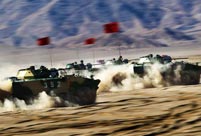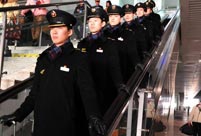 Cockfighting show staged in E. China's Heze during Spring Festival
Cockfighting show staged in E. China's Heze during Spring Festival
 Chinese New Year Flower Fair opens in San Francisco
Chinese New Year Flower Fair opens in San Francisco
 Festivities in Shanghai
Festivities in Shanghai
 PLA navy conducts drill in North China Sea
PLA navy conducts drill in North China Sea
 World's high-tech hotels
World's high-tech hotels
 Li Na poses with trophy on Brighton Beach in Melbourne
Li Na poses with trophy on Brighton Beach in Melbourne
 Six Chinese divers back safely after 300-meter saturation dive
Six Chinese divers back safely after 300-meter saturation dive
 Traditional wedding ceremony of Yao people
Traditional wedding ceremony of Yao people
 Taipei Game Show attracts geeky gamers
Taipei Game Show attracts geeky gamers
Chinese President Xi Jinping has arrived at Sochi, Russia, on invitation for the opening ceremony of the 22nd Winter Olympic Games slated for tomorrow. This is the first time for China's leader to attend a large-scale sports event overseas and also for Xi to pay an official visit to a foreign country this year. While most world leaders, notably those from the US, the UK, France and Germany, will not go to Sochi amid a specter of censure, Xi's presence makes close Sino-Russian ties even more prominent.
The Sochi Games have been politicized by Western public opinion and Russia is facing the same scenario as China in 2008. Despite the March 14 Lhasa Riots, the US and French presidents, George Bush and Nicolas Sarkozy, finally made it to Beijing for the opening ceremony of the 28th Summer Olympics, and UK prime minister Gordon Brown attended the closing ceremony. Russia has seen no serious events in the past couple of years, but Western countries still keep attacking the nation.
Though Russia has generally accepted the Western political system with a multi-party institution and democratic election, the West has long been carping about it, which is indeed chilling. It is estimated that as of now, there have been a multitude of news reports criticizing the Sochi Games by revealing corruption cases, bureaucracy, abuses of public power, pessimistic human rights, a degraded environment, media censorship, anti-gay laws, unfair treatment to economic migrants, ethnic conflicts and other social quandaries in Russia.
The first warning Sochi 2014 has rendered China is that implementation of "Western-style democracy" will not help reach a mood of détente with Western nations, which adopt attitudes toward big powers like China and Russia in line with their geopolitical interests.
Xi's attendance at the Games in no way implies that China is in confrontation with the West. In actuality, the aggregate power of both Beijing and Moscow is still far less than that of the Western world.
Nevertheless, bilateral cooperation between Beijing and Moscow is highly resilient. Political dynamics determines that the two global strategic powers are unlikely to be isolated, so it is doomed to fail when the West attempts to separate China from Russia.
Xi's presence at the 2014 Sochi Games constitutes an unconventional protocol in China's diplomatic endeavors, but this is also anticipated by strategic analysts. This represents Beijing's support for Russian President Vladimir Putin, reflecting a certain feature of Sino-Russian relations.
The bilateral ties are enjoying the best time ever in history though they have embarked on different paths of political development. Meanwhile, China's relations with Vietnam and North Korea are far more sensitive, fully showcasing that state-to-state relations are so intricate that it is naïve to view them from the perspective of ideology.
The Sino-Russian friendship is a significant pillar of world peace and balanced global power, which is further proved by the Sochi Winter Games.
 3D film 'The Monkey King' premieres in Beijing
3D film 'The Monkey King' premieres in Beijing  Miss Chinese Int'l Pageant 2014 held in Hong Kong
Miss Chinese Int'l Pageant 2014 held in Hong Kong 'Golden Flowers' in the Spring Festival travel rush
'Golden Flowers' in the Spring Festival travel rush Li Na beats Cibulkova to win Australian Open
Li Na beats Cibulkova to win Australian Open Sexy models at Taipei Game Show 2014
Sexy models at Taipei Game Show 2014 'Living in ice house' competition held in central China
'Living in ice house' competition held in central China  Highlights of Chinese airborne troops'exercises
Highlights of Chinese airborne troops'exercises  All-male high speed train crew during Spring Festival travel rush
All-male high speed train crew during Spring Festival travel rush PLA navy drills in East China Sea
PLA navy drills in East China Sea President Xi visits border troops ahead of Lunar New Year
President Xi visits border troops ahead of Lunar New Year What do Chinese pack in their luggage in Spring Festival Rush?
What do Chinese pack in their luggage in Spring Festival Rush? Blind date fair in Hangzhou of Zhejiang province
Blind date fair in Hangzhou of Zhejiang province Film 'Where Are We Going, Dad' premiered in Beijing
Film 'Where Are We Going, Dad' premiered in Beijing  Australian Open champion Li Na returns to hometown Wuhan
Australian Open champion Li Na returns to hometown Wuhan Twin sisters serve during Spring Festival travel rush for the first time
Twin sisters serve during Spring Festival travel rush for the first timeDay|Week|Month